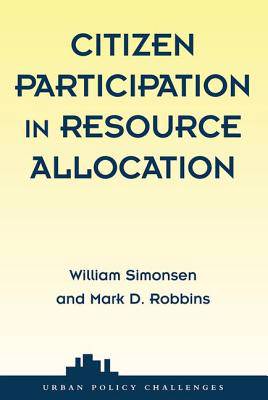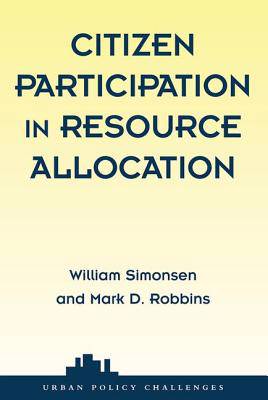
- Retrait gratuit dans votre magasin Club
- 7.000.000 titres dans notre catalogue
- Payer en toute sécurité
- Toujours un magasin près de chez vous
- Retrait gratuit dans votre magasin Club
- 7.000.000 titres dans notre catalogue
- Payer en toute sécurité
- Toujours un magasin près de chez vous
79,45 €
+ 158 points
Format
Description
Not all citizens seek to extract a '`'free lunch' from government by demanding more services at the same time that they eschew taxes. It is possible to gather the insights of an representative and informed citizenry in sophisticated and reliable form. Citizen Participation in Resource Allocation explores the means to obtaining informed insight from citizens in ways that can aid decision-makers who seek to understand the preferences of the public as a whole ?not just from its most vocal critics. Simonsen and Robbins present a description and analysis of several specific participation efforts from throughout the United States. They also examine more generally the idea of participation mechanisms, the objectives they seek to achieve and the roots of their contributions to governance. The authors look at the ways in which participatory efforts have evolved to shape and be shaped by the changing needs of the nation. Then they turn their attention to an analysis of findings from Eugene Decisions, an innovative participation mechanism combining forums and surveys created in an attempt to allow citizens to propose solutions to an ongoing budget deficit. Citizen Participation in Resource Allocation exposes the contemporary glut of participation projects to the scrutiny of objective questioning and analysis. What makes citizen participation efforts useful? How has citizen participation evolved in the life of public administration? Which participation processes are best poised to provide a clear view of the budget balancing preferences of informed citizens? How do citizens respond to questions about their specific solutions to a government's budget crisis?The authors, researchers at the University of Oregon and the University of Georgia, combine their efforts to present a lively and concise look at the traditions of participation and its practical use for resource allocation decisions.
Spécifications
Parties prenantes
- Auteur(s) :
- Editeur:
Contenu
- Nombre de pages :
- 200
- Langue:
- Anglais
- Collection :
Caractéristiques
- EAN:
- 9780813368245
- Date de parution :
- 15-12-99
- Format:
- Livre broché
- Format numérique:
- Trade paperback (VS)
- Dimensions :
- 151 mm x 221 mm
- Poids :
- 272 g







